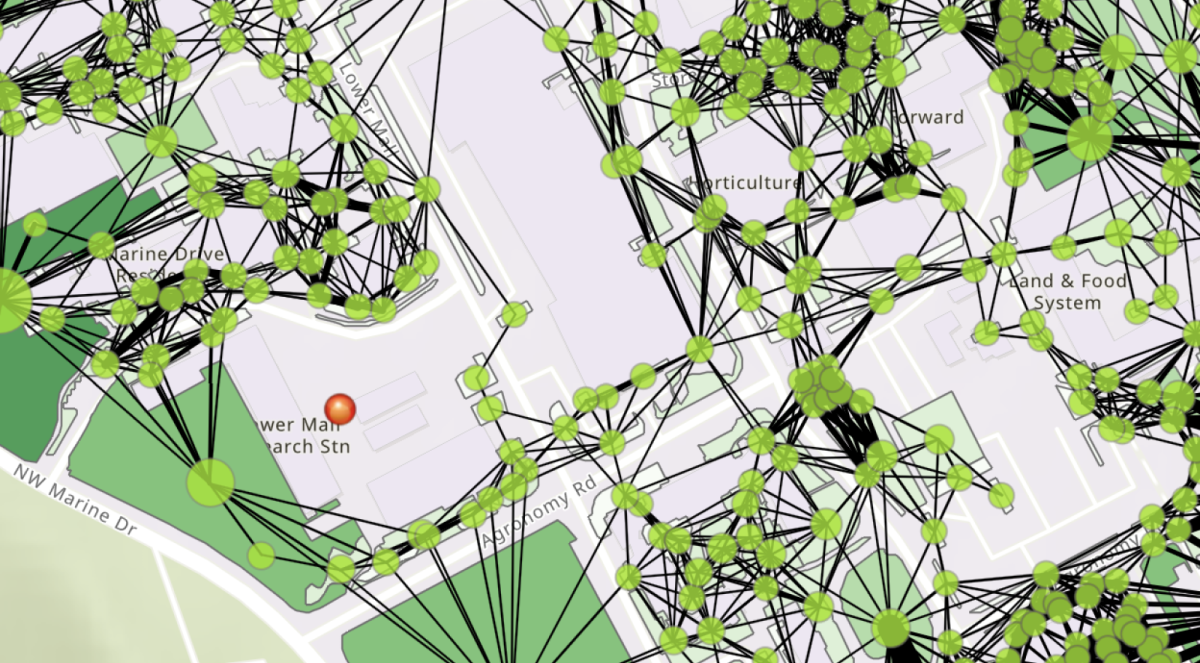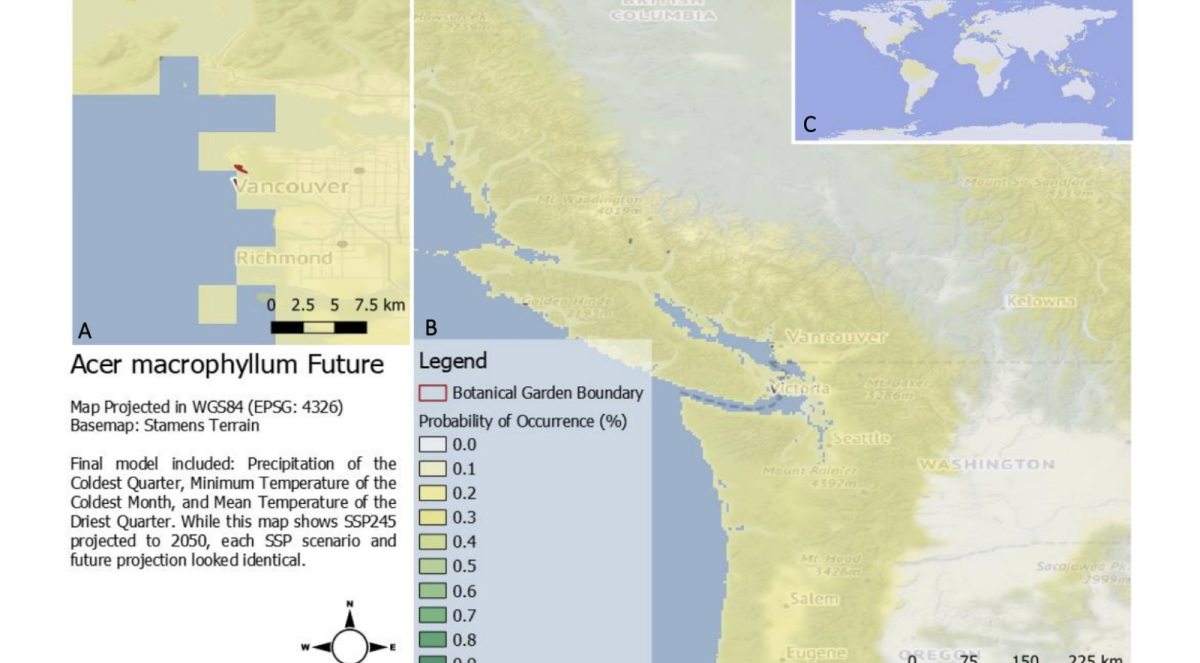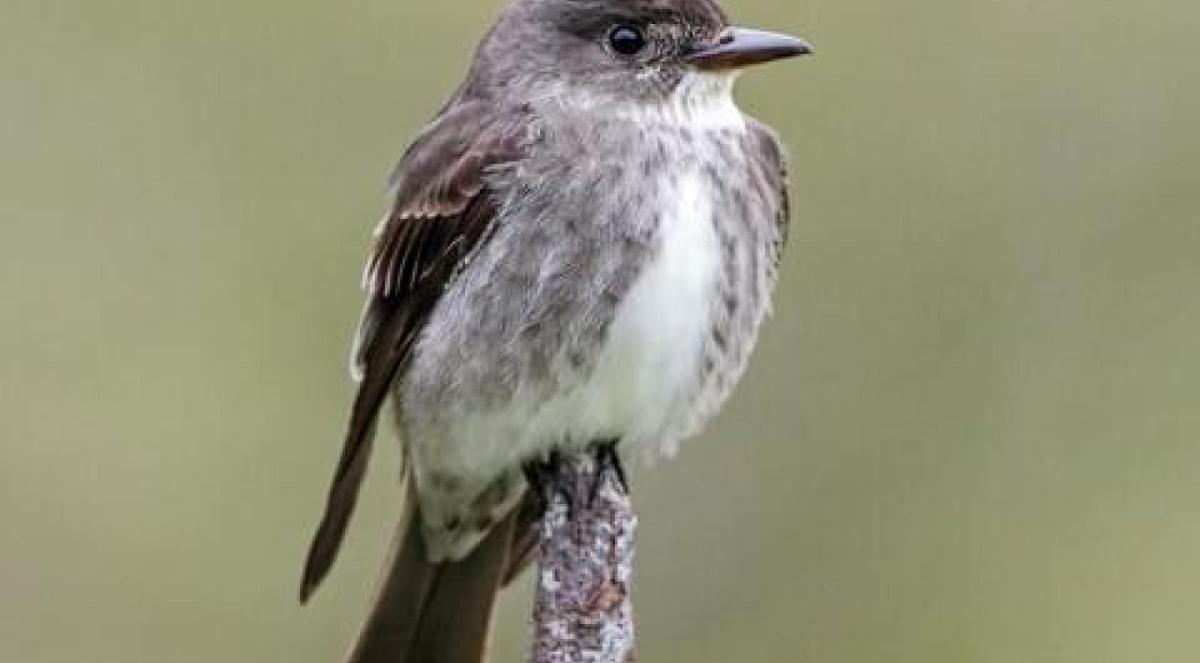The Campus Biodiversity Initiative: Research and Demonstration (CBIRD) serves as an interdisciplinary and multi-stakeholder hub for connecting students, academics, practitioners and the wider community in collaborative applied research to advance scalable urban biodiversity ideas, policies and actions on campus.
CBIRD is UBC’s platform for biodiversity partnership, enhancement, conservation and stewardship through applied research, community engagement, and the growth of a thriving biodiversity network.

Campus Ecological Connectivity - In Partnership with the SEEDS Program, Nick Mantegna, an undergraduate in the Urban Forestry program, developed UBC’s first analysis and innovative map of the connectivity of greenspaces on the UBC Vancouver Campus to inform UBC greenspace design and management moving forward.

Climate Adaptation Scenarios: Four species of Maple at the UBC Botanical Garden - In this project, MGEM student Courtney Stevens completed a climate suitability analysis for four species of maples, both native and exotic, informing practices at UBC.

Birds on UBC’s Vancouver Campus - This student-led project used a mix of community surveys and ecological information to develop a list of significant species where scalable habitat changes can be made.
By participating in a CBIRD collaboration, you can:
-
Join a well-established interdisciplinary campus network and contribute to applied student research and collaborations that can generate scalable solutions to conserve and enhance campus urban biodiversity.
-
Help inform and advance UBC’s urban biodiversity plans, policies and practices.
-
Contribute to campus engagement in urban biodiversity.
-
Strengthen your knowledge of urban biodiversity challenges and solutions from diverse disciplines and perspectives.
-
Grow your network and make connections with campus operational practitioners, faculty , students and community partners.
ABOUT
Together with the Faculty of Science, SEEDS launched CBIRD in 2016 as a new interdisciplinary initiative funded by a Teaching & Learning Enhancement Fund (TLEF) grant to expand its work in advancing sustainability and applied research on the Vancouver campus to a new thematic area — biodiversity.
CBIRD has evolved into a thriving initiative that includes a governance structure with interdisciplinary faculty and cross-campus operational partners, formalized applied research clusters, and strong alignment to inform campus planning, policies and practices that can enhance, conserve, & steward campus urban biodiversity through meaningful engagement and mutual learning.
WHO WE ARE
CBIRD is led by a Steering Committee including representation from six of UBC’s faculties and schools, and 15 academic and operational departments, and provides advisory guidance to advance CBIRD vision to enhance, conserve, and steward campus urban biodiversity. Together with their extended networks, the CBIRD Steering Committee provides interdisciplinary expertise and guidance to help inform and advance the development and implementation of campus policies, plans and practices which address and respond to key urban biodiversity and related issues. This is done through local research projects and partnerships that utilize the Campus as Living Laboratory.
Action Teams are made up of engaged experts from the CBIRD Steering Committee and other partners who support the implementation of priorities. For example, the CBIRD Ecosystem Services Action Team develops technical analyses and scopes student research and collaborations between staff, faculty and students that can inform campus biodiversity policy and practices. View our UBC Campus Biodiversity Knowledge Networks to see a visualization of CBIRD Steering Committee, Action Teams and affiliated networks, and learn more about the people behind this work.
Applying a community based and systems approach, CBIRD has established the following vision, mission and goals:
VISION
To enhance, conserve, & steward campus urban biodiversity through meaningful engagement and mutual learning, and advance sustainability education and student led research. Through applied whole-systems thinking, CBIRD serves as an interdisciplinary partnership platform to enable this vision to unfold for net positive outcomes for human and ecological health.
MISSION
To inform policy and practice that enhances biodiversity through research, education, campus and wider community engagement, and demonstration.
GOALS
1. Inform and advance policies and plans which address and respond to key urban biodiversity issues
2. Advise and co-develop scalable solutions that inform practices for tackling the urban biodiversity crises through local research projects and partnerships
3. Create applied student research and impactful learning opportunities and interdisciplinary partnerships that utilize the Campus as Living Laboratory
4. Cultivate biodiversity stewards through increasing public awareness and knowledge, demonstration projects, citizen science and biodiversity celebrations
5. Strengthen UBC’s leadership in urban biodiversity conservation and stewardship considering future climate conditions
RESEARCH FOCUS AREAS
RESEARCH FOCUS AREA 1: CAMPUS URBAN BIODIVERSITY BASELINE
Goal:
Create a baseline of campus biodiversity assets across multiple taxa, habitat types, and ecosystem functions to refine current biodiversity monitoring and inform campus policies and practices
Key Deliverables:
- Multi-Year Applied Research Initiative: 2022-2025 Campus Urban Biodiversity Baseline Strategy piloted and launched.
RESEARCH FOCUS AREA 2: CAMPUS URBAN BIODIVERSITY INTEGRATED VALUATION
Goal:
Develop a deeper understanding of the integrated valuation of biodiversity on the UBC Vancouver Campus.
Key Deliverables:
- Campus Urban Biodiversity Natural Assets Valuation, including ecosystem and social cultural services
RESEARCH FOCUS AREA 3: CAMPUS URBAN BIODIVERSITY THREAT & VULNERABILITY ASSESSMENT
Goal:
Determine key vulnerabilities and threats facing urban biodiversity loss for the UBC Vancouver Campus
Key Deliverables:
- Threat & Vulnerability Assessment including identification of species most vulnerable, and factors that lead or pose a risk to urban biodiversity loss at the campus and beyond
KEY ACCOMPLISHMENTS AT A GLANCE
STUDENT ENGAGEMENT
- Over 400 students conducted applied CBIRD research projects with over 60 staff and community partners generating 78 student-led research reports.
POLICIES PLANS AND PRACTICES
-
Providing policy recommendations to support UBC in furthering its biodiversity targets. Key policies and plans include: Campus Vision 2050, Green Building Action Plan, Campus Urban Biodiversity Strategic Plan, UBC’s Technical Guidelines, and Climate Action Plan 2030.
-
Key policy recommendations to inform management practices around climate impacts on urban forests including Maple suitability at the UBC Botanical Garden.
-
To inform data collected in phases 1-3 of the UBC Vancouver Student Tree Inventory, an analysis and baseline of campus trees using City of Vancouver LiDAR data was completed to inform future landscape planning on the UBC Vancouver.
-
First analysis of ecological connectivity for UBC Vancouvers campus green spaces completed that identified areas where connectivity and ecological resilience could be enhanced as well as provided insight for future decision making, planning, and accelerating climate action.
-
A baseline of Bird Species on UBC Vancouvers campus based on community survey and conservation data to determine ten species of native birds where scalable improvements could be made to improve biodiversity on campus.
INTERDISCIPLINARY PARTNERSHIPS
Committees & Action Teams
Formalized governance structure includes a Campus Urban Biodiversity (CUBS) Plan, interdisciplinary CBIRD Steering Committee, and supporting Action Teams who provide interdisciplinary expertise and guidance on student research and collaborations that can help inform urban biodiversity related planning and practices, give feedback on strategic priorities and initiatives, provide input on initiative progression, and promote the communication of outcomes.
-
The Ecosystem Services Action Team
This Action Team has been taking a lead on integrating biodiversity and ecosystem service practices and principles with emerging policy and planning processes, as well as developing a campus natural asset baseline.
KNOWLEDGE MOBILIZATION
Publications
-
UBC in a Changing Climate: Urban Forest Edition Report (2021)
This report showcases research completed to help establish a baseline assessment of the campus urban forest.
Download the Executive Summary
Download the Full Report -
CBIRD Biodiversity Report (2017)
This report reviews the CBIRD vision, mission, strategic framework and context behind creating the interdisciplinary platform.
Map
- UBC’s Urban Biodiversity Community Data Hub: This map provides a visualization of campus biodiversity GIS data and supports student research and faculty curricular integration of biodiversity topics. Learn more.
- Biodiversity Asset Campus Urban Biodiversity Resources Map: This map provides information about urban biodiversity research initiatives and groups, people, and landscape features on the UBC Vancouver campus.
-
UBC Campus Biodiversity Knowledge Networks Map: This map provides information about UBC people networks and initiatives connected to urban biodiversity.
Events
- Biodiversity Showcase - Biodiversity for Resilient Communities (2018)
CBIRD hosted its 2nd Annual Biodiversity Showcase on Biodiversity for Resilient Communities in 2018 at the UBC Botanical Garden. This event brought together a network of biodiversity researchers, practitioners, SEEDS project participants, and engaged community members for an evening of dialogue and learning to showcase efforts towards enhancing biodiversity for resilient cities here at UBC and beyond.
- Biodiversity Showcase (2017)
CBIRD hosted its first annual Biodiversity Showcase in 2017 at the Beaty Biodiversity Museum. The event celebrated the milestones achieved after the completion of the first year for CBIRD and student, faculty, and staff collaboration to address real-life sustainability and biodiversity challenges on the Vancouver campus. It provided an opportunity to publicly showcase the year’s student biodiversity research and outcomes and to bring together the biodiversity community for networking and educational opportunities. Approximately 100 people from a wide range of backgrounds.
READY TO CONNECT AND EXPLORE A CBIRD COLLABORATION?
Please get in touch if you have questions or would like to get involved with CBIRD.
Liska Richer
Manager, SEEDS Sustainability Program | Campus + Community Planning
Emma Luker
Engagement and Sustainability Planner | Campus + Community Planning